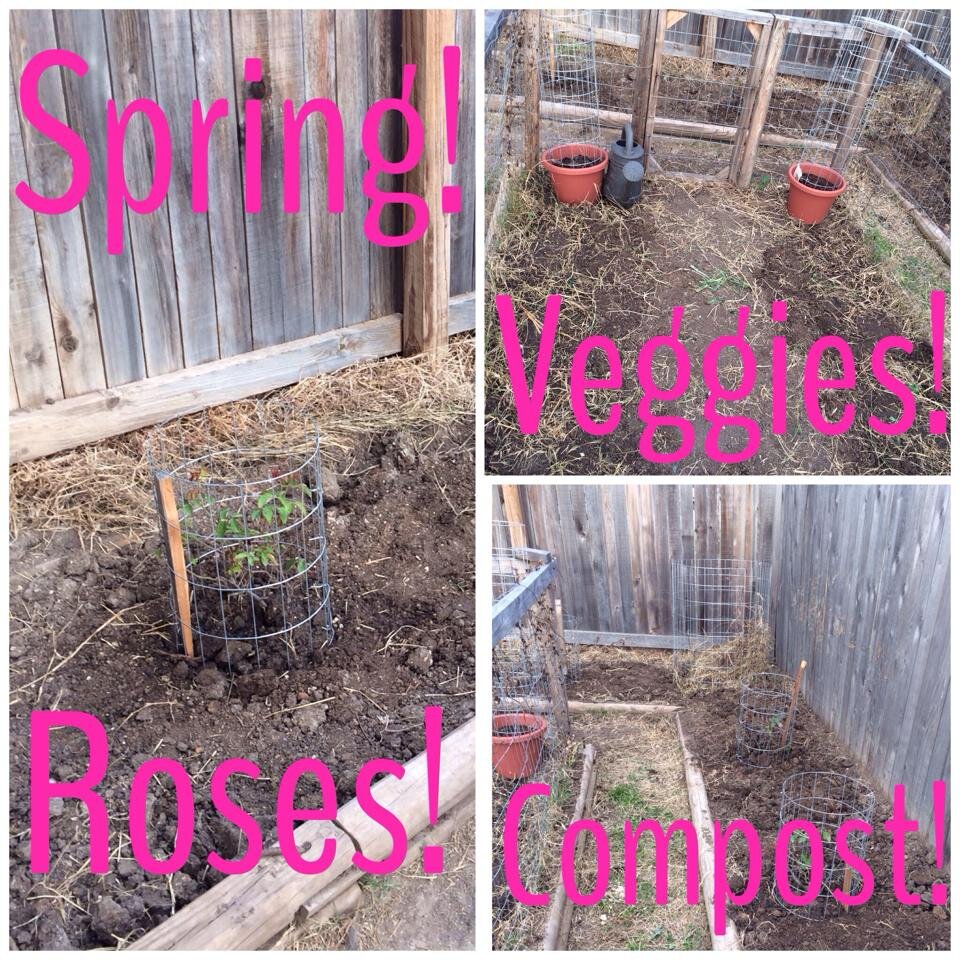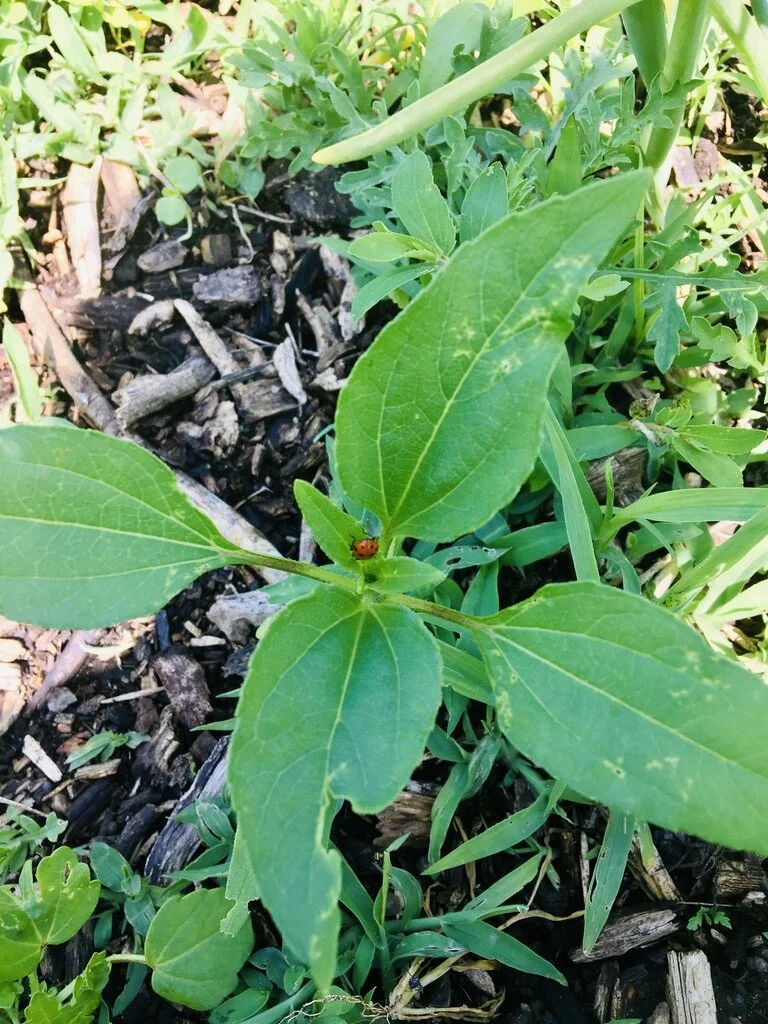All My Best Gardening Tips From A Non-Expert Gardener!
Every Spring I get at least a couple messages from friends or online acquaintances asking me their gardening or chickening questions. I love getting these messages, so keep them coming! I figured that more people probably have those same questions, so I thought I'd compile all my best gardening tips into one nice post. Maybe you're just curious, maybe you haven't gotten up the courage to message me your burning gardening question, or maybe you've always wanted a garden but have no idea where to start. Either way, I hope reading about what I am doing helps you in some way.
First, I want to make sure you know that I do not consider myself a gardening expert. My gardening goal every year is simple: produce a little more than I did the year before. I have found that this goal leaves room for lots of grace, space to learn, and even for failures.
My first garden was in the backyard of our Texas house. It was your typical suburban neighborhood and not an agricultural neighborhood like where we are living now. My husband built two raised beds with chicken wire fencing around one of them and a simple little latch gate for me to enter. The ground where we lived at the time was pretty much just clay, so the raised beds were a good fit. The wire fencing around it was purely functional, to keep our dogs out. One bed ended up being rose bushes with a compost pile in the corner, our first go at being a low waste kitchen. From what I remember our main raised bed had tomatoes, cucumbers, squash, green beans and bell peppers.
Our First Garden Set Up - New Braunfels, TX
I remember it took me a few years of planting tomatoes with no results before I finally got the sweetest, juiciest tomatoes. I also remember thinking the beans were a whole lot of work for very little yield. Also, I joke that I could grow squash anywhere. It's the one thing I know will always grow when I plant it. I love you squash! It's a great first veggie to plant if you're just getting started.
One year, I had a bell pepper plant that was a very late bloomer. I carefully transplanted it to a pot and brought it in the house over the winter. It was so nice having fresh peppers over winter and I got really attached to this little plant. That next Spring, I carefully transplanted it back outside, only to have our new puppy manage to destroy it. It was heartbreaking, but it's a good story about how attached gardeners can actually get to their work. If you're spending time every day watering and weeding, you're going to be invested physically and emotionally, so be prepared for that!
Once we moved to the farm, we could tell where the previous owner had kept a large garden, so we decided to plant in that same area. The first year I used a soil block maker to start my seeds in the garage. This ended up being a good way to make an all you can eat buffet for mice (fail). We also used wood chips as a weed suppressant that first year, which worked really well. For the past two years, we have planted directly from seed to soil. We usually have a group of friends or family join us for planting day and it's become a really special time for us. I encourage you to make your garden a family or group effort, it'll be so much more enjoyable that way.
Our garden this year is off to a great start and I think I know exactly why: we planted right where our last pigs used to hang out. Even though they have been gone for months, you could still smell their natural fertilizer as we were working on planting day. I am seeing plants pop up so much quicker than normal, including some first time plants for us like potatoes and radishes! So, if you can, consider some natural fertilizer!
When you visit our garden, which I hope you do someday, you won't see something that is perfectly manicured, completely weed free, meticulously tended, or something worthy of the full page middle spread of some fancy home and garden magazine. Sure we could fertilize for a better crop or spray away all the pests, but we are really big on working with nature and not against it. I don't stress if I see bugs in my garden, even if they're getting some of the veggies, because that means I created a comfortable enough ecosystem for bugs to want to be!
It's not uncommon for me to find ladybugs, worms, and frogs hiding in my garden.
Okay, here are a few of my best gardening tips, from a non-expert gardener:
Soil Testing - find your closest agricultural extension office and pick up a soil test kit. Usually for a very low cost or even just a donation, they will analyze your soil for you. This is good to see if there is something in your soil that isn't conducive to what you're trying to grow or even if your soil is missing a key ingredient.
Seed Packets - it was just last year that I learned there is so much helpful information on those little packets that seeds come in. Many times they will tell you what variety, what time of year to plant, when to harvest, and even have little pictures of what your seedlings should look like! Now I keep and arrange my seed packets in small binder just in case I need to reference them.
Let It Grow - One thing I still sometimes struggle with is knowing what is a weed that needs to be pulled and what is actually a baby veggie plant, especially if it's the first year planting certain veggies. The pictures on the seed packets help, but one thing I have learned is that it's easier to identify plants when they're a little bigger. So if you're unsure about a plant, let it grow up a little. Eventually it will be obvious if it doesn't look like your other plant babies and you can then pull that weed with a little more confidence.
Local Experts - My last tip is to find and listen to local experts. You need someone you can call with questions that has been around your area for a while. This person will most likely already know all about the soil and the weather in your area. Weather is really important when it comes to gardening so get used to checking the forecast and looking up historical data. When I moved from Texas to Kansas, I had already been gardening, but I underestimated how different the two climates were. I felt like I had to start from the beginning, but having a local expert I could talk to made it so much easier.
In closing, I want to know if you still have a gardening question for me? Do you have a tip that you want to share? If so, comment below! Also, be sure to follow me on Instagram for the latest in our homesteading adventures!
XO - Olivia


